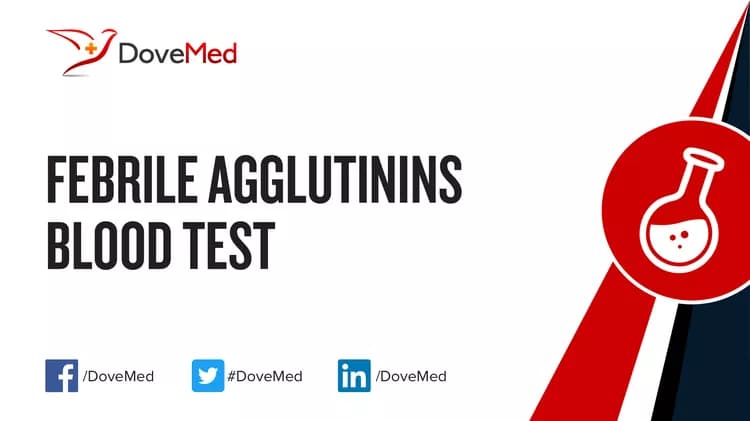What are other Names for this Test? (Equivalent Terms)
- Febrile Group Blood Test
What is the Febrile Agglutinins Blood Test? (Background Information)
- Febrile agglutinins are antibodies that clump upon exposure to their antigen, causing fever.
- When the immune system encounters an invader, it rapidly produces defense proteins (antibodies) that target the invader. These antibodies recognize specific components (antigens) of that invader; e.g. proteins, cellular membrane lipids, etc.
- Thus, the presence of an antibody specific to a bacterial or viral antigen implies that the body has been infected by that pathogen either in the past, or that the body is currently experiencing an infection
- When an antibody targets an antigen, an immune reaction is started that may include fever
- There are several types of antibodies. The 2 most clinically important antibodies are called IgM and IgG
- IgM is produced within days of infection as part of the primary immune response. Elevated levels of IgM indicate a ‘new’ infection
- IgG is produced several weeks after infection as part of the secondary immune response. Elevated levels of IgG indicate a chronic or past infection
- The Febrile Agglutinins Blood Test helps detect antibodies (IgM or IgG) specific to fever-causing infectious diseases. It aids in the diagnosis of fever of unknown origin
- Common fever-causing infectious diseases include brucellosis, salmonellosis, typhoid fever, paratyphoid fever, tularemia, and rickettsial infections
- The test is performed by making dilutions of a blood sample; for example, 2-fold, 4-fold, 8-fold, and so on, and mixing each diluted sample with antigens of fever-causing infectious pathogens
- Subsequent steps allow for the visualization of possible interactions between the antibodies and antigen through a reaction (such as through emission of light, color change, etc.). The highest dilution in which a reaction takes place is called the titer
What are the Clinical Indications for performing the Febrile Agglutinins Blood Test?
Following are the clinical indications for performing the Febrile Agglutinins Blood Test:
- Fever
- Fatigue
- Pale appearance
- Rash
- Headache
- Stiffness
- Muscle weakness
- Joint pain
- Sore throat
How is the Specimen Collected for the Febrile Agglutinins Blood Test?
Following is the specimen collection process for Febrile Agglutinins Blood Test:
Sample required: Blood
Process of obtaining blood sample in adults:
- A band is wrapped around the arm, 3-4 inches above the collection site (superficial vein that lies within the elbow pit)
- The site is cleaned with 70% alcohol in an outward spiral, away from the zone of needle insertion
- The needle cap is removed and is held in line with the vein, pulling the skin tight
- With a small and quick thrust, the vein is penetrated using the needle
- The required amount of blood sample is collected by pulling the plunger of the syringe out slowly
- The wrap band is removed, gauze is placed on the collection site, and the needle is removed
- The blood is immediately transferred into the blood container, which has the appropriate preservative/clot activator/anti-coagulant
- The syringe and the needle are disposed into the appropriate “sharp container” for safe and hygienic disposal
Preparation required: No special preparation is needed prior to the test.
What is the Significance of the Febrile Agglutinins Blood Test Result?
A positive value for the Febrile Agglutinins Blood Test is associated with a reaction taking place with a blood sample that has been diluted more than 20-40 times (i.e., a titer above 1:20-1:40). This may indicate:
- Brucellosis
- Tularemia
- Salmonellosis
- Typhoid fever
- Paratyphoid fever
The laboratory test results are NOT to be interpreted as results of a "stand-alone" test. The test results have to be interpreted after correlating with suitable clinical findings and additional supplemental tests/information. Your healthcare providers will explain the meaning of your tests results, based on the overall clinical scenario.
Additional and Relevant Useful Information:
- The Febrile Agglutinins Blood Test is performed using samples taken when the individual was actively undergoing infection (acute phase) and several weeks later (convalescent phase)
Certain medications that you may be currently taking may influence the outcome of the test. Hence, it is important to inform your healthcare provider of the complete list of medications (including any herbal supplements) you are currently taking. This will help the healthcare provider interpret your test results more accurately and avoid unnecessary chances of a misdiagnosis.
The following DoveMed website link is a useful resource for additional information:
https://www.dovemed.com/diseases-conditions/typhoid-fever/
Please visit our Laboratory Procedures Center for more physician-approved health information:
http://www.dovemed.com/common-procedures/procedures-laboratory/
Related Articles
Test Your Knowledge
Asked by users
Related Centers
Related Specialties
Related Physicians
Related Procedures
Related Resources
Join DoveHubs
and connect with fellow professionals


0 Comments
Please log in to post a comment.